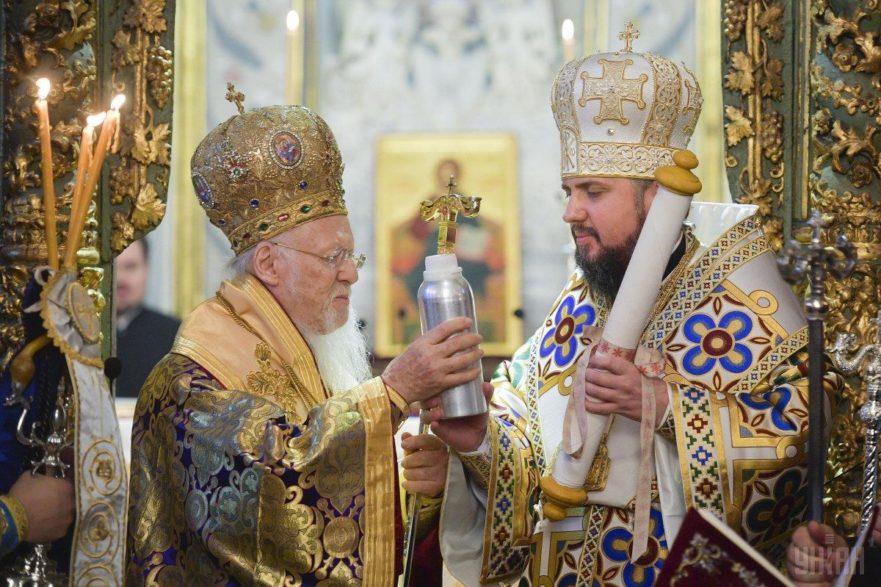Readers of history will recall the Great Schism of 1054 as the moment when the western Catholic Church and Eastern Orthodox Church parted ways, a separation that punctuated the end of the Roman Empire. That split, with its religious and political undertones, rocked Christendom in the 11th century and remains a visible wound even today, never fully healed though softened with time.
Ten centuries later, a new schism has formed, this one between the Russian Orthodox Church and the newly formed Orthodox Church of Ukraine. Metropolitan Epiphanius was elected head of the new church in December, a move condemned by Moscow but viewed by many believers in Ukraine as a safeguard against Russian aggression, which began in earnest with Russia’s annexation of Crimea in 2014. This weekend, the Ecumenical Patriarch in Istanbul (the source of authority for the Eastern Orthodox tradition) granted a “tomos,” or decree of independence to the Ukrainian Orthodox Church. The separation process could take decades, but the fracture has begun.
The news is not good for Moscow. By some estimates, the division will cost the Russian Orthodox Church some 30 to 40 percent of its members, not to mention valuable church property and bragging rights as the “protector” of the world’s 300 million Orthodox Christians worldwide. Yet, while Ukraine’s break with Russia is a dramatic turn of events, an even deeper schism lies between the Russian government and its own people, particularly people of faith.
The Russian government targets nontraditional religious minorities with fines, detentions, and criminal charges under the pretext of combatting terrorism and unwanted foreign influence. Russian law is used to crack down on fundamentalist Muslim groups, Protestant denominations, and members of groups it identifies as “cults,” such as Jehovah’s Witnesses and Scientologists. Proselytizing in public is banned, putting at risk members of the Hare Krishna movement and Mormon missionaries, among others.
“Russia is trending in the wrong direction,” said U.S. Ambassador-at-Large for Religious Freedom Sam Brownback in testimony before the Commission on Security and Cooperation in Europe (also known as the U.S. Helsinki Commission) in December.
Brownback noted that Russia’s “overly broad anti-extremism laws are misused to target, for prosecution, peaceful members of religious minorities and unduly restrict peaceful, religious expression of belief and worship.” The ambassador sited 156 cases of so-called illegal missionary activity currently under investigation in Russia involving groups such as the Salvation Army, the Presbyterian Church, the Lutheran Church, a series of Muslim groups, and members of The Church of Jesus Christ of Latter-day Saints. The persistent and severe violations of religious freedom throughout Russia prompted the U.S. Department of State to include the country on its Special Watch List in 2018.
Russia is trending in the wrong direction
Freedom of religion and conscience is an important barometer to gauge the nature of a regime. Governments that respect the human dignity of their own citizens likely will treat their neighbors well too; those that oppress their countrymen make poor partners. Russia seems to be proving this theory. In its 2018 Annual Report, the U.S. Commission on International Religious Freedom (USCIRF) concluded that, “Russia is the sole state to have not only continually intensified its repression of religious freedom since USCIRF commenced monitoring it, but also expanded its repressive policies to the territory of a neighboring state [Ukraine] by means of military invasion.”
Take Action
- Read more about the impact of Russian anti-extremism policies here
- Learn more about Russia’s ban on Jehovah’s Witnesses and Scientologists
- Add your voice to preserving international religious freedom
[Photo Credit UNIAN: Ecumenical Patriarch Bartholomew I handed the tomos of independence of the Orthodox Church of Ukraine over to its leader, Metropolitan Epiphanius of Kyiv and All Ukraine]

